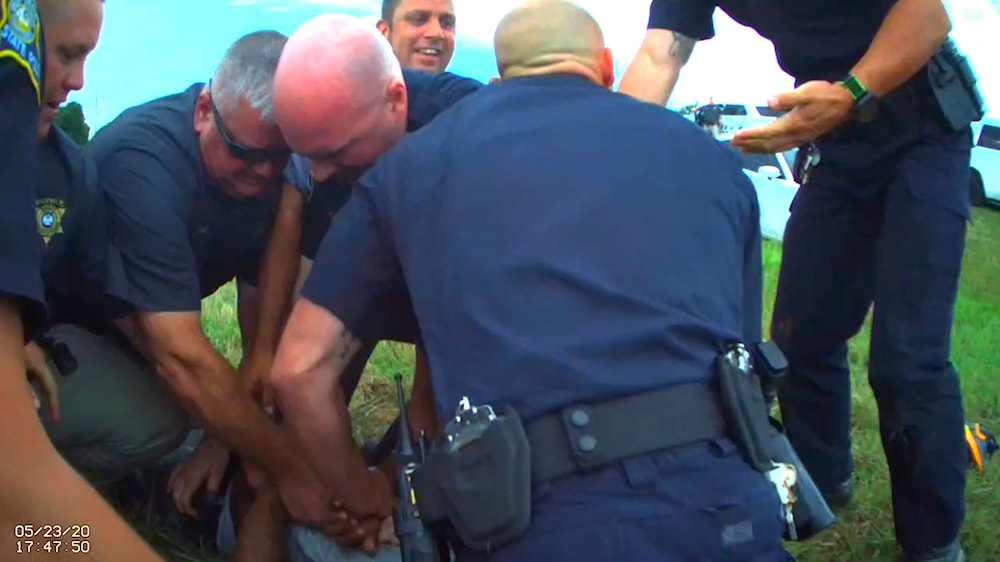Louisiana drops charges against officers who beat Black motorist
Antonio Harris' arrest is called “inexcusable” by state police, who highlighted “excessive and unjustifiable force" use by the state troopers who arrested him.
-

May 23, 2020, image from Franklin Parish Sheriff's Office body camera video shows law enforcement officers restrain Black motorist Antonio Harris on the side of a road in Franklin Parish, Louisiana
The US judicial system has yet again failed to address the list of discrimination against African Americans. Prosecutors in the state of Louisiana dismissed charges against police officers who were recorded beating a Black motorist and lifting him up by his hair braids, and later bragging in text messages that the “whoopin’” would give him “nightmares for a long time.”
Antonio Harris was arrested in 2020 and came after the fatal 2019 arrest of Ronald Greene in the same state.
Harris’ attorney, Michael T. Sterling, after finding out about the dismissals from AP, which confirmed them in an interview with the district attorney, said, “The system is rigged against people like Antonio,” adding, “The record was clear that these officers senselessly and ruthlessly beat Antonio Harris and lied about it in reports. It’s hard to understand what’s going on here.”
Harris' arrest was called “inexcusable” by state police, who identified “excessive and unjustifiable force" use by the state troopers in kneeing, slapping, and punching him after his surrender.
Read next: Louisiana policeman shoots unarmed black man in the head, kills him
Talking to investigators, Harris said, “They kept saying ‘Stop resisting’ but I was never resisting... As soon as they got to me, one of them kneed me in my face. One of them was squeezing my eyes.”
Another 'Rodney King'
Acoording to an internal investigation, the troopers filed “wholly untrue” reports that claimed Harris kept trying to run away and refused to obey and fought with the officers before they pounded him with what Trooper Jacob Brown called “tactical strikes”. As a result, Harris spit up blood and suffered from stomach pain and sore ribs for days.
14 text messages were later discovered full of “lol” and “haha” responses ridiculing Harris. In one of the texts, Brown said, “He gonna be sore tomorrow for sure,” and, “warms my heart knowing we could educate that young man.”
District Attorney Penny Douciere, who initially promised to take them to trial, dropped misdemeanor charges in November against Brown and Trooper Dakota DeMoss weeks after a separate federal jury acquitted Brown of another charge in the beating of another Black motorist 18 times with a flashlight.
Douciere didn't say why the charges were dropped but said that she intended to dismiss the charge against George “Kam” Harper, the third white trooper charged. DeMoss and Harper were fired while Brown resigned.
The high-speed chase began after Harris was pulled over for a minor traffic violation and was found to have a suspended license and outstanding warrants.
Harris then led them on a 29-mile (47-kilometer) chase that reached speeds of 150 miles (241 kph) before being stopped by a tire-puncturing spike strip. Even after Harris surrendered, DeMoss “delivered a knee strike” and slapped him in the face before turning off his body camera, as per court records.
Harper hit Harris in the head several times with a fist “reinforced” by a flashlight and threatened to “punish” him as Brown pulled his hair and DeMoss is seen on the footage lifting him to his feet by his braids. Investigators indicated that Brown never revealed to the prosecutors that there was footage of the arrest from the body camera.
Back to the roots
In September last year, a fresh report released by the UN International Independent Expert Mechanism to Advance Racial Justice and Equality in the Context of Law Enforcement revealed that "systemic racism" against individuals of African descent is ravaging US police forces and the criminal justice system as it calls on authorities to amp up efforts of reform.
Read more: Indigenous America: The US kills its victim and walks in its funeral
According to the report, racism - the legacy of slavery, the slave trade, and 100 years of legalized apartheid - continues to spread today through racial profiling, police killings, and other human rights violations.
It noted that African Americans are three times more likely to be killed by police than whites, and 4.5 times more likely to be imprisoned, adding that only 1% of the over 1,000 cases of murder by police each year result in officers being indicted.

 4 Min Read
4 Min Read








